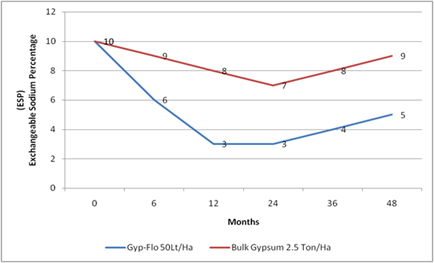GYP-FLO Product Description
GYP-FLO is much easier to handle and apply via boom spray, drip systems, overhead irrigation and aerial applications, compared to the spreading of bulk gypsum. In addition GYP-FLO is also a great source of Calcium and Sulphur for plant nutrition.
GYP-FLO has a particle size of only 5 micron and is more than 80% available in much quicker results in overcoming soil compaction, unlike bulk gypsum that has particle size of 1000 micron (1mm) average with a solubility rate of only 0.24%. After 4 years of field trials, studies confirmed that the finer particles remain more active in the soil than the courser particles of "bulk gypsum".
|
GYPSUM
|
SURFACE AREA (M2)
|
|
PRODUCT
|
AVG PARTICLE SIZE
|
RATE/Ha
|
PER 1KG
|
PER RECOMMENDED
RATE
|
|
Bulk Gypsum
|
1000 micron
|
2.5 Tonne
|
325 M2
|
812,500 M2
|
|
Fine Gypsum
|
50 micron
|
400 Kilograms
|
6,500 M2
|
2,600,000 M2
|
|
Gyp-Flo
|
5 micron
|
50 Litres
|
65,000 M2
|
3,250,000 M2
|
Source: Australian Fertility Manual, Editor V.S Glendinning, CSIRO Publishing 2000.
Field Trial Results
FIELD TRIAL - BULK GYPSUM/GYP-FLO COMPARISON
The graph represents a common result for both products. GYP-FLO contains high levels of available Calcium (>80%) to reduce exchangeable Sodium percentage. Bulk Gypsum contains high total amounts of Calcium however due to its low solubility of .24% and average particle size of 1,000 micron, it is generally not as effective in reducing Sodium.
The quality of irrigation water and type of fertiliser will affect the long term results of both Gypsum and GYP-FLO.

FIELD TRIAL/GYP-FLO
Crop: Wine Grapes
Location: Mildura, Victoria
Application Method: Drip Irrigation
Application Rate: 75Lt
GYP-FLO has reduced the soil Exchangeable Sodium Percentage dramatically by 69%, therefore providing a superior growing profile for the vines without moving the soil pH with only one application in one growing season.
FIELD TRIAL BULK GYPSUM/GYP-FLO COMPARISON
Crop: Cauliflower
Location: Werribee South, Victoria
The graph represents a trial comparison between Bulk Gypsum at 5 tonne per hectare and GYP-FLO at 100 and 150 litres per hectare. All treatments were applied pre-planting and were tested after harvest approximately 16 weeks after planting. GYP-FLO applied at 100 litres proved to be the most cost effective treatment over Bulk Gypsum at 5 tonne and GYP-FLO at 150 litres.